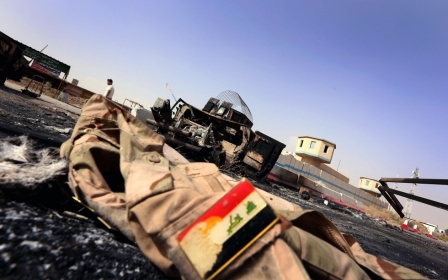As Obama vetoes troops and Shiite cleric calls for arms, Iraq battle rages on

As the US president announced that the country will not send troops back into Iraq and a top Shiite cleric, known for his pacificism, encouraged Iraqis to take up arms, militant fighters reportedly launched air strikes on a city about an hour's drive from Baghdad.
There were also reports that Iran deployed around 300 members of its elite Revolutionary Guard units into Iraq to protect Shiite shrines in Karbala and Najaf.
On late Friday, it was unclear who was in charge of the city of Samarra where the Islamic State of Iraq and the Levant (ISIL) announced at 21:50 GMT through its Twitter account that it had launched air strikes on the city. The strikes reportedly killed tens of soldiers as well as leading figures in the military.
Earlier in the day, there were reports that volunteer fighters in Samarra were stepping up to fill the void left after soldiers from Iraq’s official army fled. Iraqi police trucks were seen ferrying Shia volunteers to the city, the home of the two Shia shrines in the Imam al-Askari complex whose targeting in 2006 ignited a deadly sectarian conflict, according to the Guardian.
“Thousands” of people living in Baghdad’s Sadr City also registered as volunteers to join the fight in Samarra, reports Alforat news agency.
If confirmed, these would be the first air attacks from ISIL over their nearly week-long offensive in which the group has captured Mosul and Tikrit, to add to Fallujah which the group captured in January, in a march towards the capital Baghdad.
Iraqi Prime Minister Nuri al-Maliki had travelled earlier to Samarra to discuss the security situation with local politicians in the Salah al-Din province, where Tikrit is located.
Following the visit, Maliki’s office moved to deny rumours that the Prime Minister had been targeted in Samarra, according to US-based Bloomberg News.
Maliki has come under increasing attacks this week from fellow politicians who say his policies have led the spread of militancy in the country.
'We can't do it for them'
Without naming Maliki, US President Barack Obama took a similar tack on Friday: in a brief statement from the White House lawn, Obama warned the Baghdad government that it had brought disaster upon itself by failing to heal the divides between Sunni and Shiite camps in the country.
Maliki's government has asked the United States to provide military assistance to counter ISIL's advance.
While Obama said the US will not send troops, he also said it would still be "several days" until he and his national security advisors announce their strategy. Whatever the strategy, the US, he stressed, will not provide military support without political solutions.
"Any action that we may take to provide assistance to Iraqi security forces has to be joined by a serious and sincere effort by Iraq's leaders to set aside sectarian differences, to promote stability and account for the legitimate interests of all of Iraq's communities, and to continue to build the capacity of an effective security force," he said, adding, "We can't do it for them."
Also on Friday, in an unprecedented call, top Shiite cleric Grand Ayatollah Ali al-Sistani called for Iraqis to take up arms against "terrorists" who have overrun swathes of the country in a major offensive.
"Citizens who are able to bear arms and fight terrorists, defending their country and their people and their holy places, should volunteer and join the security forces to achieve this holy purpose," his representative announced on his behalf during Friday prayers in the city of Karbala.
"He who sacrifices for the cause of defending his country and his family and his honour will be a martyr," he added.
The elderly Sistani, who rarely appears in public, is highly influential in the Shiite Muslim world and known more usually for calls to non-violent action.
The shrine city of Karbala announced the departure of thousands of volunteer fighters headed for Baghdad, after al-Sistani's fatwa.
According to pro-Shia news site, Iraq Face, the deputy head of the Kerbala governorate Ali al-Maliki said that “five thousand” volunteers had left the city, a sacred site for Shii Muslims, had left to protect the capital from an “infiltration of terrorists.”
In other news in Iraq on Friday:
- In Tikrit, 60 kilometres north of Samarra, Iraq’s counter-terrorism unit says it has killed ISIL’s legislative mufti, Saqr al-Nasiri. In a statement released to Sumaria TV, the unit said it had targeted Nasiri in central Tikrit.
Al-Jazeera reports that a drone strike hit Tikrit on Friday, with unsubstantiated suggestions that the target was a mosque in the mainly Sunni city.
- Friday also saw Iraqi air forces launch strikes on both Tikrit and Baiji, 40 kilometres north-west of Tikrit and home to Iraq’s largest oil refinery.
The strikes left some 40 dead, “among them militants” according to al-Jazeera.
- Unverified reports on social media suggest that Sadr City, the Baghdad district home to an estimated one million Shias, was targeted, with bombings on Friday killing 19 and injuring 55.
This follows a suicide attack, reportedly targeting a funeral tent, that killed 16 on Tuesday in the impoverished district unofficially renamed after a Shia leader.
- There are also reports from Sumaria TV of a deadly bombing on Friday in Tarmiya, a small town north of Baghdad populated mainly by Sunnis.
Stay informed with MEE's newsletters
Sign up to get the latest alerts, insights and analysis, starting with Turkey Unpacked
Middle East Eye delivers independent and unrivalled coverage and analysis of the Middle East, North Africa and beyond. To learn more about republishing this content and the associated fees, please fill out this form. More about MEE can be found here.




